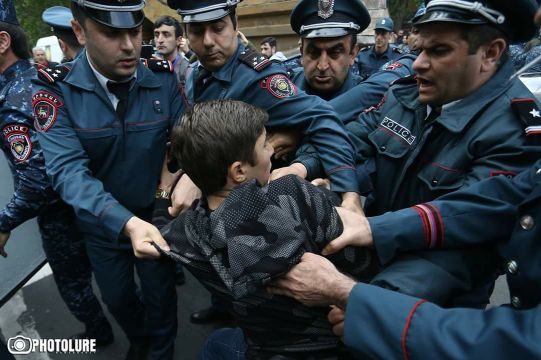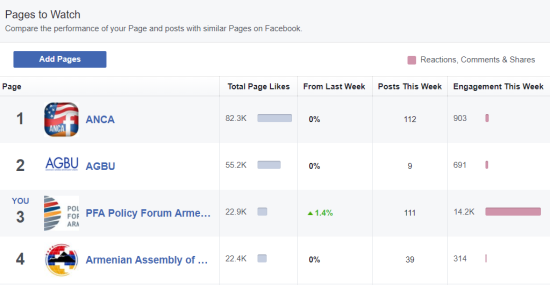On April 17, 2018, Serge Sargsyan—who occupied the position of Armenia’s President for two terms since 2008—was chosen by Armenia’s parliament to be the new Prime Minister with enhanced executive powers. This was made possible by the Constitution of 2015, which—together with the parliamentary elections of April 2017—ushered in the ruling Republican party and sealed the deal for Sargsyan to become the PM essentially without term limits.
The legitimacy of the constitutional “reform” has been in doubt since the beginning. Like the 2008 election that first brought Sargsyan to power, the December 2015 constitutional referendum was widely criticized as fraudulent (see PFA’s 2016 report). And even though Sargsyan insisted he had no intention of seeking the new prime minister position, the opposition knew that this was a lie and predicted the events of the past week with pinpoint accuracy.
Main traditional Diaspora organizations were largely complicit with the regime and worked against the best interests of Armenia and its citizens. The position of the ARF-Dashnaktsutyun is particularly noteworthy. This group, which endorsed Sargsyan’s candidacy for the PM office, remained in coalition with the ruling Republican party for years. They held three ministerial portfolios and some lesser positions (including regional gubernatorial) and have amply contributed to the corruption and mismanagement in the country. Finally, they pushed heavily for the new Constitution that ended up propelling Sargsyan to his current position. Despite their nationalist rhetoric, they endorsed the (Russian foreign Minister Sergey) Lavrov’s plan to Artsakh resolution, involving handover of a big chunk of liberated territories to Azerbaijan in exchange for peace.
In return, the ARF has—implicitly or explicitly—committed itself to keeping the Diaspora in check and suppressing dissent literally and figuratively. Having a loyal and very loud grassroots presence meant to help. The complicity of other groups and their collaboration with the regime has been somewhat less explicit but equally damaging for the welfare of Armenian citizens. One of them recently demonstrated fascinating displays of support by congratulating Sargsyan on the occasion of his appointment, at a time when Armenia is witnessing an unprecedented wave of civil protests that is very likely to bring down the current regime.
The low popularity of traditional Diaspora organizations is reflected, among other things, in the following comparison of Facebook page traffic statistics:
While having a relatively small audience (“Total Page Likes” at 22.9 thousand, at par with that of the Armenian Assembly), Policy Forum Armenia’s Armenia-centric messages attracted the attention of social media users and generated nearly 15 times the number of “engagements” received by ANCA, which has 4 times more followers (at 82.3 thousand) than PFA. Their audiences have not grown during the same week (all three groups—ANCA, AGBU, and AAA—have registered no growth from last week, while PFA’s followers grew by 1.4 percent during the same period), another indication of low popularity among Facebook users and perceived connection of those organizations with the regime in Yerevan.
So, how should the Diaspora respond to the latest developments and beyond?
First, diaspora Armenians should be wary of justifications of Sargsyan’s cynical power grab that claim continuity is good for the country “in times of war.” Any student of introductory political science knows that the “rally ‘round the flag effect” produced by war can be easily manipulated by unpopular regimes, and that they exploit this effect whenever they can. The reality is that Armenia has been at war for its entire post-Soviet existence. Having Sargsyan in power for the last decade has done nothing to change that, and in fact, given the casualties and territorial losses as a result of the four-day war in 2016, it can be argued that his regime has not served Armenia’s defenses well.
Azerbaijan remains Armenia’s enemy in this protracted war, and Armenians are always quick to criticize the dictatorial Aliyev regime, its sham elections, and the governance style. So, why would they want Armenia’s political system to more closely resemble that of Azerbaijan? Not only would that be a profound national embarrassment, but it would seem to defeat the purpose of having liberated Armenian territories and its population from one dictatorship, only to subject them to another. In other words, Armenians should not resign themselves to autocratic rule, simply because the autocrat is Armenian.
Second, a major internal soul-searching is warranted before the leaders of the “traditional” Diaspora organizations are allowed to continue to play any role in public life in Armenia and Diaspora in the future. Their corrupt dealings of those leaders with the regime in Yerevan should be exposed and all perpetrators brought to light. All credible evidence of their affiliation with Russian intelligence agencies should be investigated and collaborators brought to justice in their respective jurisdictions.
With specific regard to the ARF, a transparent accounting of its record and role in Armenia’s politics is urgently needed. Along with other diaspora institutions, ARF was a factor in preserving Armenian culture and communities around the globe during the Cold War. In the early days of Armenia’s independence, President Levon Ter-Petrossian’s hostility toward the ARF’s involvement in Armenian politics suggested it was an oppositional force that—for better or worse—could check the power of the ruling regime. Those days are long gone. The ARF in Armenia has been brought to heel by Kocharyan and Sargsyan, and the party now sees its interests as almost entirely aligned with that of the latter and against the interests of Armenia. Diaspora supporters of the ARF who feel loyal to the “Armenian cause” need to ask themselves whether this cause is truly being served by their Armenia-based party leadership. Short of a massive shake up within the party that results in a replacement of the current leaders by a young and Armenia-centric team, the party’s activities should be suspended in Armenia.
Third, the Diaspora’s approach to engagement requires rethinking. The model of Diaspora as the “milk cow” for the regime that is being kept out of Armenia’s politics should be reconsidered. Milk cows have only one way to exercise influence, and that is by adjusting the flow of milk.[1] Diaspora Armenians shore up the ruling regime every time they donate to the state-run Hayastan All-Armenian Fund; every time they participate in state-run programs, such as the Ministry of Diaspora’s “Ari Tun” youth heritage tourism program; every time they attend government functions, meet with government ministers, and have their photos taken with members of the regime; every time they pay the government for nominal Armenian citizenship and passports; and every time they support diaspora lobby groups that demand Genocide recognition, but refuse to criticize Armenia’s domestic politics that undermine all our causes.
(Famous US rock band) System of a Down’s lead singer Serj Tankian, who took part in April 2017 parliamentary elections as an observer, issued the following statement on his Facebook page two days ago:
“Something incredible is happening in Armenia, finally. Civil disobedience is growing and taking the form of labor and student strikes against an unjust, corrupt ruling elite. This week is the first week of a new Armenia for whatever happens, the apathy has been dissolved. Serge Sarkissian (old Pres-new PM) has himself admitted that likely 60% of the population dislike and disagree with him. Yet he persists with his patronizing attitude and rule. Serge, no disrespect meant, but you are not our father and we are not your children. You have served the people of Armenia and are no longer a viable, respected leader whether you stay or go rendering your rule ineffective and at this point dangerous. They say it’s not over till the fat lady sings. That lady is Mother Armenia singing her ass off in the streets right now.”
Would this signal a change in position of Diaspora, at least its independent, non-institutional part? This indeed is the million-dollar question.
There are better ways for diasporans to be engaged with Armenia. Countless grassroots organizations working for social change that desperately need diaspora assistance, including independent media sources and think tanks that deserve increased readership, non-state-run heritage tour programs that encourage deeper immersion and engagement, genuine opposition leaders to pose for photos with, and genuine opposition movements to proudly (and loudly) support.
Armenia is not the ruling regime, Armenia is the Armenian people. When the two are in conflict, it is crystal clear which side the diaspora must be on.
Image: Photolure.
[1] Borrowing from political scientist Kristin Cavoukian.



You must be logged in to post a comment.